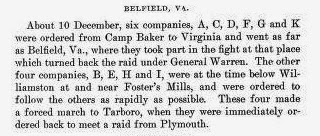Rebecca Kirkman was born 10 February 1845 to William Kirkman and Mary (last name unknown). At about 15 years old, on 10 November 1861, she had her first child, Martitia Lee Ward. Martitia's father is assumed to be Zeno Ward. Zeno may not have known Rebecca was even pregnant when he enlisted with his brother, Minus, in the 22nd North Carolina Infantry, a part of the Confederate States Army, on 18 June 1861.
 |
| Taken from Service Records |
Zeno had an eventful experience in the War. Less than six months after enlisting, he catches pneumonia and is hospitalized. He was shot in May 1863 to the point of needing surgery at the hospital in Richmond, Virginia. He was later wounded again and captured at Gettysburg. After Gettysburg and his time as a POW, it seems he was furloughed. But then, in May 1864, he was listed as being absent without leave.
 |
| Taken from Service Records |
On 8 May 1864, he married Rebecca back home in Randolph County, North Carolina.
Maybe Minus had found out about his child while he was absent from the War, and maybe somehow he got the word to Zeno. In any case, I find Zeno's actions very honorable. I like him very much!
In 1870, he is seen living down the road from his parents in Sandy Creek in Liberty, Randolph County, North Carolina with Rebecca, Martitia, and another child, Alfred T. (Alfred was born in 1865. I have a feeling he was a honeymoon baby.)
 |
| Clipping from 1870 census |
Rebecca seems to have not wasted any time though in finding another man to support her and her children. While I don't know who she married (if she married) after Zeno, she had two more children in the mid-1870's. They appear in the 1880 census carrying the last name Ward.
 |
| Clipping from 1880 census |
 |
| Clipping from 1880 census |
| Clipping from 1930 census showing David's age at first marriage being 16 |
 |
| Clipping from 1900 census |
Children of Zeno and Rebecca:
- Martitia Lee Ward, b. 1861, d. 1931
- Alfred T Ward, b. 1865
- Ella C Ward, b. 1869
Children of Unknown and Rebecca:
- Mary J Ward, b. 1874
- Martha C Ward, b. 1876
- John W Foust, b. 1883
- Maud Elsie Foust, b. 1886, d. 1973
Rebecca, David, and Zeno are all buried at Grays Chapel United Methodist Church Cemetery.
 |
| David H. and Rebecca C. Foust Copyright Brittany Jenkins, 2011 |
Sources:
- 1870 Sandy Creek, Liberty, Randolph County, North Carolina U.S. Federal Census (accessed on Ancestry)
- 1880 New Salem, Randolph County, North Carolina U.S. Federal Census (accessed on Ancestry)
- 1900 East Franklinville, Randolph County, North Carolina U.S. Federal Census (accessed on Ancestry)
- 1910 East Franklinville, Randolph County, North Carolina U.S. Federal Census (accessed on Ancestry)
- 1930 Franklinville, Randolph County, North Carolina U.S. Federal Census (accessed on Ancestry)
- Compiled Service Records of Confederate Soldiers Who Served in Organizations from the State of North Carolina (accessed on Fold3)
- Tombstone, David H. and Rebecca C. Foust (photo taken Christmas 2011)
- Tombstone, Zeno Ward (photo taken Christmas 2011)



















